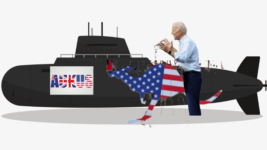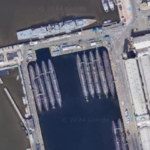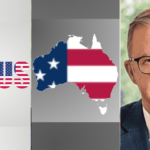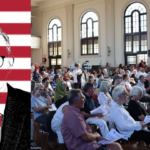Congress’ Thinktank Flags AUKUS Alternative: US Submarine Base in WA and no Australian Subs

When then PM Scott Morrison imposed the AUKUS pact and submarine deal upon the Australian constituency in September 2021, the fanfare and the hype of the announcement did leave the viewer with the impression that the nation would be acquiring eight nuclear-powered submarines (SSN).
AUKUS involved dropping an existing submarine deal with France on the pretext it was delayed, in order to acquire nuclear-propelled boats, with the US and UK to share technologies with us, and further creating “a new security partnership”, to deal with “security changes in the Indo Pacific”.
The AUKUS Optimal Pathway Pillar I was released during a San Diego presser on 14 May 2023, which is when the details were laid out: Australia was to buy 3 Virginia class SSN from the US, then produce 5 AUKUS SSN with UK assistance, and, oh, by the way, the US would be establishing a sub base in WA.
In fact, a 16 July released paper by the US congress’ thinktank spells it out like this: AUKUS Pillar I has three stages. The first is establishing a US-UK rotational submarine force in WA. The second is the US sells us three to five Virginia SSN, and then it and the UK assists us in building our own AUKUS SSN.
But the Navy Virginia-Class Submarine Program and AUKUS Submarine (Pillar 1) Project: Background and Issues for Congress report outlines when comparing the “potential benefits, costs, and risks” of the three stage plan, it might just be better for the US to operate more of its own boats out of WA.
SRF-West a go-go
Produced by the 110-year-old public policy research institute the Congressional Research Service (CRS), the new report gives it straight to congress regarding the financial viability of the original proposed optimal pathway, which, in turn, carries with it a lack of reason for Australia to acquire SSN.
The reasoning behind AUKUS, and for Australia to replace its current aging Collins class conventional submarines with SSN, is rising tensions in the Indo Pacific, which are based upon Beijing threatening US economic hegemony and Washington’s solution to this being to progress towards war with China.
A further unexplained reason as to why the AUKUS deal involved Australia acquiring SSN, which had to be filled in by the commentariat, is that Collins class boats are built for defence and don’t have the capacity to attack China, as Virigina class SSN do, which is due to their nuclear propulsion.
The first time that the public became aware of the US-UK Submarine Rotational Force-West was via the White House Briefing Note released at the time of the March 2023 San Diego announcement.
Also known as SRF-West, the joint rotational force will consist of four US SSN and one UK SSN.
To be established by 2027, SRF-West will be based at HMAS Stirling off the coast of Perth on Garden Island. More than 700 US personnel and their families will move to WA to run it. And a deal has just been established to store the radioactive waste from the US and UK boats on the same island.
A morphing optimal pathway
CRS advises that the US Navy has been procuring Virginia SSN since fiscal year (FY) 1998, and to FY2024 a total of 40 have been procured. The procurement rate was 2 subs a year, but since 2022 the production rate has dropped to 1.2-1.4, so there’s a growing rate of boats procured but not yet built.
This poses a threat to the three to five second-hand Virginia SSN the US is supposed to sell to Australia in the early 2030s, as the US Navy needs to produce enough of these boats to replace those then to be sold to us, which means the production rate eventually has to rise to about 2.33 per year.
Yet, the Pentagon’s March-released FY2025 budget only provides for one Virginia SSN, and a key issue for Congress now is whether to stick to this or push for two. Those who support producing two consider it will strengthen the industry and send a stronger signal to potential adversaries, like China.
And the other issue is the cost of AUKUS Pillar 1, as the US has to produce three to five extra Virginia SSN in order to sell the same amount to Australia and then the US and UK will have to assist Australia in building three to five new AUKUS class SSN to complete the original eight boat deal.
The long game revealed
The CRS then presents Congress with an alternative that, based on “potential benefits, costs, and risks”, might be more effective and that is “procuring up to eight additional Virginia-class SSNs that would be retained in US Navy service and operated out of Australia along with the US and UK SSNs”.
This AUKUS Pillar I alternative would further involve a US-Australian division of labour, and this would comprise of US SSNs performing “both US and Australian SSN missions, while Australia invested in military capabilities for performing non-SSN missions for both Australia and the United States”.
The report then suggests the US-Australia division of labour might mimic similar arrangements Washington has with its NATO allies in relation to military capabilities, such “as aircraft carriers, SSNs, large surface combatants and amphibious ships”.
So, how would AUKUS Pillar I change under this model? Well, stage one, the establishment of SRF-West would remain the same. And as for stage two and three, the US would acquire eight Virginia SSNs that it would build itself and operate out of Western Australia using US Navy personnel.
But what of the billions Australia was set to “purchase, build, operate, and maintain its own SSNs” with?
Well, the US congress’ thinktank suggests that “those funds could be invested in other military capabilities”, such as long-range missiles and bombers, “so as to create an Australian capacity for performing non-SSN military missions for both Australia and the United States”.







